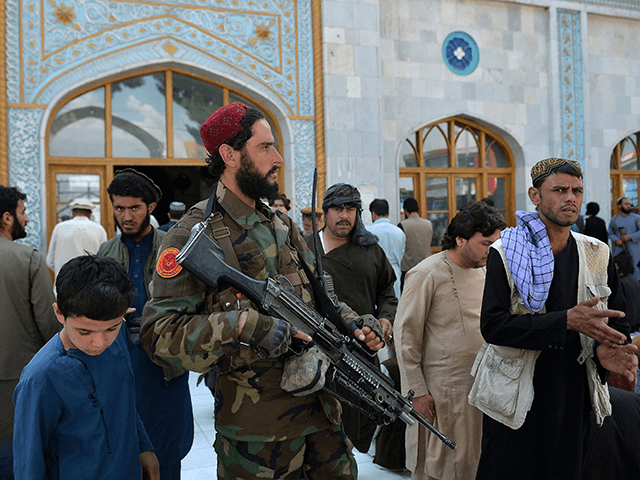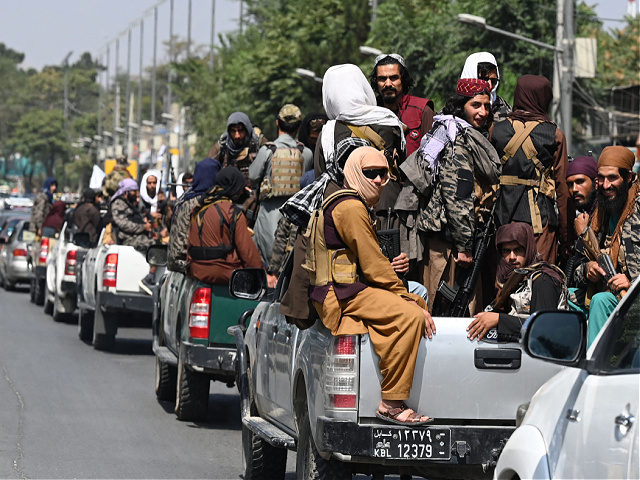A spokesperson for the Taliban has cautioned the United States regarding potential future interferences with their culture and treatment of women in Afghanistan.
According to Fox News, Taliban spokesperson Suhail Shaheen has advised the U.S. not to attempt to change or manage any cultural practices that the Taliban implements under an impending regime.
Shaheen told Fox News that women should not be educated without a hijab. After stating that women and girls should be required to wear hijabs in the classroom, the spokesperson aimed to appease any Western worries regarding human rights before making the Taliban’s wishes for autonomy on the world stage clear.
“There will be no issue about women’s rights. No problem about their education, their work,” Shaheen stated. “But we should not be after changing each other’s culture as we are not intending to change your culture, you should not be changing our culture.”

An armed Taliban fighter stands guard as Muslim devotees leave after Friday prayers at the Pul-e Khishti Mosque in Kabul on September 3, 2021. (Photo by HOSHANG HASHIMI / AFP) (Photo by HOSHANG HASHIMI/AFP via Getty Images)
The spokesperson recalled the United States’ 20-year occupation in Afghanistan and made clear that a new era in the country has begun. “We have closed one chapter. For us it was occupation,” he began. “We ended that, we were staging resistance. But now that is closed. it is the past. We have to focus on the future that is better for them and for us.”
Shaheen also gave remarks regarding future diplomacy with the United States as he suggested, “we should be focusing how we can work together in a positive and constructive way which is in the best interest of both sides.”
Shaheen’s comments come off of the heels of a Reuters report that outlined a Taliban plan to implement a new government in Afghanistan. Co-founder of the Taliban, Mullah Abdul Ghani Barada, will be the leader of the government once installed and the son of fellow co-founder, Mullah Mohammad Yaqoob, as well as Sher Mohammad Abbas Stanikzai will be granted high-ranking positions.
All other government positions will only be occupied by members of the Taliban, which will entail 25 ministries and a committee of 12 Muslim scholars. As the Taliban prepares to organize a new regime, “all of the top leaders have arrived in Kabul, where preparations are in final stages to announce the new government,” according to an anonymous Taliban source.

A Taliban member looks up standing next to a damaged helicopter at the airport in Kabul on August 31, 2021, after the US has pulled all its troops out of the country to end a brutal 20-year war — one that started and ended with the hardline Islamist in power. (Photo by Wakil KOHSAR / AFP) (Photo by WAKIL KOHSAR/AFP via Getty Images)
The Taliban has an agenda to carry out a grand assembly in the next six to eight months known as a “loya jirga.” The assembly would require the participation of representatives throughout Afghanistan in order to establish a constitution and legitimized government.
Amidst growing uncertainty regarding the future rights of women in the country, dozens of Afghan women organized a demonstration to advocate on behalf of women’s rights close to the presidential palace. The protest came to halt as an armed Taliban member stepped on the scene.
Concerns for women’s rights were echoed by a former female Aghan judge, who faced imminent danger upon the Taliban’s release of prisoners she had previously sentenced to prison terms. The judge, who chose to remain anonymous after fleeing to Europe recalled, “four or five Taliban members came and asked people in my house: ‘Where is this woman judge?’ These were people who I had put in jail.”
Though it remains to be seen exactly what life will be like for Afghan women under a Taliban regime, worrying clues have become apparent.

COMMENTS
Please let us know if you're having issues with commenting.